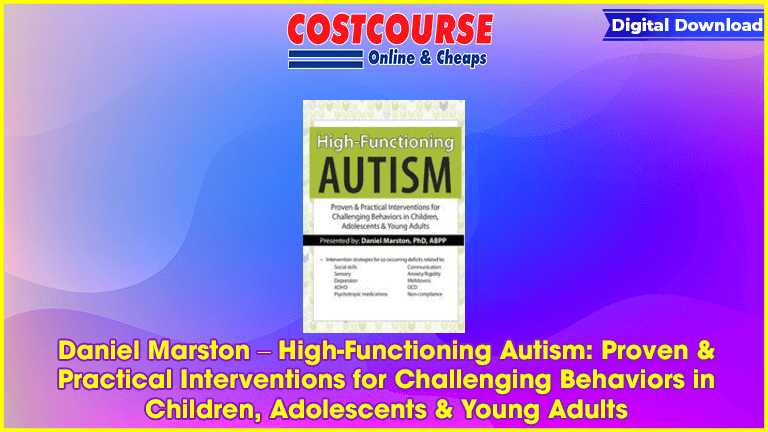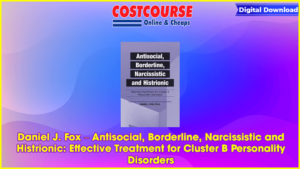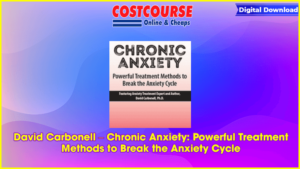Description
This recording provides proven intervention strategies, essential treatment tools, and behavioral techniques to help you analyze behaviors and actions, identify consequences for behaviors, and teach new skills to children, adolescents and young adults with high-functioning autism (HFA).
Daniel Marston – High-Functioning Autism: Proven & Practical Interventions for Challenging Behaviors in Children, Adolescents & Young Adults
Walk away with practical intervention techniques for social success, behavior changes and overcoming challenging co-occurring behaviors that deliver success through adulthood. The challenging co-occurring issues to be addressed are:
Social skills
Sensory
Depression
ADHD
Psychotropic medications
Communication
Anxiety/Rigidity
Meltdowns
OCD
Non-compliance
Gain valuable insight into common psychotropic medications, including both the helpful effects and potentially problematic side effects, that these individuals are prescribed. We will explore HFA and the new DSM-5® diagnosis of Social-Pragmatic Communication Disorder. You will receive the necessary tools to gain effective collaboration between clinicians, educators and parents.
Through case studies, video clips and class participation you will leave this recording with the confidence to identify actions that cause impediments in change, utilize more successful consequences for behaviors, and teach new skills to children, adolescents, and young adults with HFA. Don’t just manage these individuals; provide interventions that can lead to successful independence into their adult years!
Handouts
Manual – High-Functioning Autism (0.66 MB) 37 Pages Available after Purchase Instructions for ASHA Credit – SELF STUDY ONLY – 03/19/19 (38.5 KB) Available after Purchase
Outline
DSM-5® and ICD-10 Updates
Social-Pragmatic Communication Disorder
Impact on service delivery (school/community)
Successfully link home, school and therapy
IEP/504/Do they qualify for school services?
Co-morbid disorders: Why the difference is important
Social Skills Interventions
Improve social skill deficits
â€Kid Cop†behaviors and why other kids get angry
How to get peers to recognize them in positive ways
Group activities
Early intervention strategies that can deliver long-term success
Communication Interventions
Conflict resolutions that are effective in multiple settings
Help peers and family members relate
Verbal interventions that overload processing
Pragmatic language and other abstract issues
Sensory Interventions
Self-stimulation (appropriate & inappropriate)
Sensory strategies to avoid
Coping/calming techniques that reduce meltdowns
Sensory diet
Anxiety Interventions
Anxiety-reducing activities
How anxiety impacts rigidity
Help them “self-regulateâ€
Successful transitions
Depression Interventions
Impact on flexibility and change
Therapy that works for people with HFA
Emergence in adolescence
Solitude vs. loneliness
ADHD Interventions
ADHD vs. hyper-focus
Commonly prescribed medications and possible benefits and side effects
Specific triggers and what fuels the rage
Reduce aggressive and disruptive behaviors
Mistakes that escalate defiant behaviors
Overcome refusals to comply with even simple request
Obsessive-Compulsive Disorder (OCD) Interventions
What to do when they become stuck on high interest areas
Specific medication interventions
Impact on socialization and behaviors
Interventions for Specific Difficult Behaviors
Reduce Internet and electronic addictions
Changes in technology, school systems and mental health delivery
Cognitive-Behavior Therapy (CBT) for mood and anxiety
Psychopharmacological Interventions
Differentiate among common medications
Medications that mimic difficult behaviors
Side effects and off label use
Case Studies, Demonstrations & Activities
Case studies that demonstrate specific interventions for aggressive and non-compliant behaviors
iPad® apps for social success, behavioral changes and speech and language
Staff training techniques to experience what an individual on the spectrum might
Research, Risks and Limitations
Faculty
Daniel Marston, PhD, ABPP
Daniel Marston, PhD, ABPP, is a licensed clinical psychologist and an expert in the field of behavioral psychology. He is board-certified in Behavioral and Cognitive Psychology by the American Board of Professional Psychology (ABPP). He has been an adjunct faculty member for several traditional and online graduate programs and is an article reviewer for two academic journals.
For over 25 years, Dr. Marston has been treating clients with autism, anxiety, depression, ODD, ADHD, learning disabilities, Tourette’s Syndrome and neurobehavioral disorders. He conducts hundreds of behavioral evaluations per year for children and adolescents and works daily with school and community professionals, families and parents.
Dr. Marston is the owner of Marston Psychological Services, in North Huntingdon, PA, where he provides therapy for children, adolescents and families, testing and evaluations, school consultation and behavioral healthcare supervision. Dr. Marston presents and publishes nationally on the topics of autism, disruptive behavior disorders, ODD and behavior therapy. He has a strong focus on practical implementations of empirical research findings into behavioral interventions. Dr. Marston teaches professionals who work with children and adolescents, practical treatment and intervention strategies.
His new book, Autism and Independence: Assessments and Interventions to Prepare Teens for Adult Life, was published in April 2019 (PESI Publishing & Media). This game-changing guide is filled with proven strategies and skill building exercises for a population often overlooked. Dr. Marston’s book, Comparative Psychology for Clinical Psychologists and Therapists, published by Jessica Kingsley Publishers in London, focuses on the practical applications of cross-species empirical and behavioral research for clinical settings.
He also presents at national conferences and in professional publications on the topic of the impact of poverty on behavioral functioning.
Speaker Disclosure:
Financial: Daniel Marston is in private practice. He receives a speaking honorarium from PESI, Inc.
Non-financial: Daniel Marston is a Fellow, American Academy of Cognitive & Behavioral Psychology; Fellow, Pennsylvania Psychological Association; and member of the American Psychological Association.








